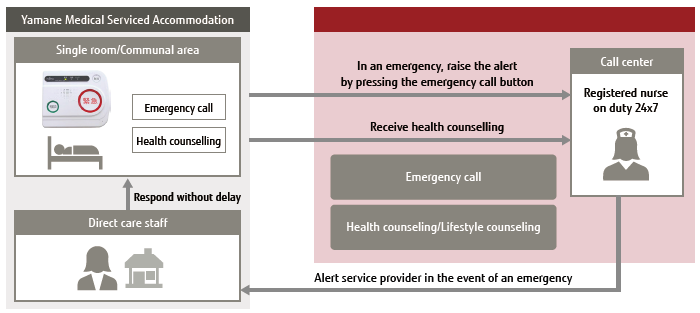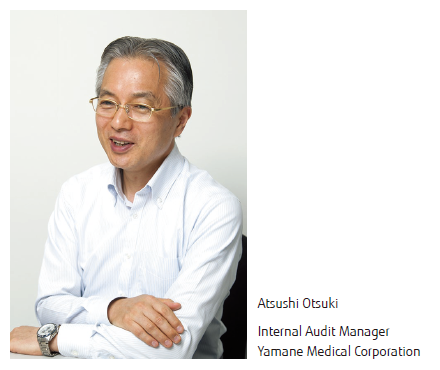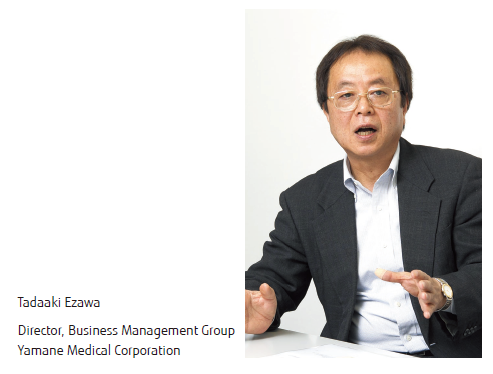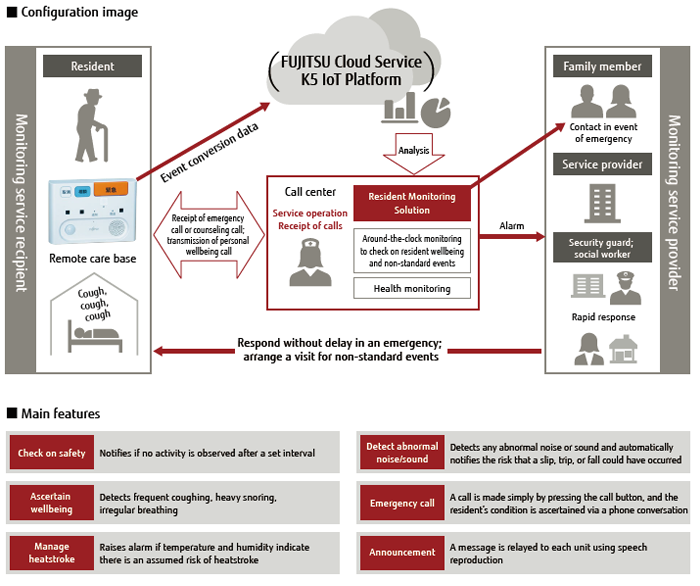Archived content
NOTE: this is an archived page and the content is likely to be out of date.
Guarding against a crisis in serviced accommodation for senior citizens

Incidents and accidental injuries are very common among residents of Serviced Accommodation for the Elderly and vulnerable (hereafter, Serviced Accommodation), which is a type of rental accommodation for senior citizens. Our particular concern is incidents that occur in single-room housing as well as incidents that occur at night. A common problem for Serviced Accommodation operators is how to design a system that enables rapid response to accidents, while at the same time reducing the load on direct care staff. Yamane Medical Corporation, a major operator of Serviced Accommodation facilities, is addressing the issue by implementing a wellbeing support system that operates 24x7 based on an emergency call service. Let’s take a look at the story behind this service.
With the rapid aging of Japan’s population, there is increasing demand for serviced rental accommodation that provides a secure place for senior citizens to live, including single-person and couples’ accommodation. Rental accommodation that meets the standards prescribed in the Act on Securement of Stable Supply of services to Elderly and vulnerable Persons’ Housing, which came into effect in October 2011, has now reached 210,000 residences nationwide in the six years since the law was enacted.
To meet the Serviced Accommodation standards, a facility has to be built to enable elderly and vulnerable residents to live safely (for example, it must be barrier-free), and must provide services that support their wellbeing, including daily checks on their safety, provision of a lifestyle counseling service, and an emergency call system. However, it does not extend to the provision of the type of high-care service found in conventional nursing homes. Serviced Accommodation is intended to be rental housing for senior citizens who are able to live independently, and in principle staff must be onsite during the day but not necessarily at night.
Unfortunately, this respect for independence has its pitfalls. There have been many cases of incidents that occur in single-room Serviced Accommodation at night and these can go unnoticed for some time. The reality is that there are possibly more residents requiring nursing care than expected, and the government is likely to take action. The Ministry of Land, Infrastructure, Transport and Tourism will reportedly move to publish information specifying minimum staffing levels at night. It is highly likely that Serviced Accommodation operators will soon be required to act to address this issue, which will pose a headache for providers already plagued by chronic staff shortages.
Implementation of ‘Home Nurse Call’, an emergency call service that targets safety and security
Against this backdrop, one aged care service provider is engaged in addressing ways of improving the monitoring of resident wellbeing. Yamane Medical Corporation, a company listed on the JASDAQ Securities Exchange, is currently rolling out a network of Comprehensive Care Centers across Japan that combine different forms of care service, including day care, respite care, and residential care. Serviced Accommodation is central to this service.
Yamane Medical Corporation began providing Serviced Accommodation in June 2013, and now runs 68 facilities nationwide. During this time, the company has focused on safety and security. A number of staff are always on duty during the day, providing lifestyle counseling and other services, and there is always one person on duty at night. The requirements for Serviced Accommodation state that there need not be staff on duty at a facility at night. However, having staff on hand definitely ensures greater peace of mind.
In deciding on a call system to receive communications from residents in emergency situations, Yamane Medical Corporation selected Fujitsu’s Home Nurse Call (HNC) emergency call system (see Figure 1). According to Yamane Medical Corporation’s Tadaaki Ezawa (Director, Business Management Group,), “Conventional systems that have internal lines and nurse call lines cause problems when multiple calls occur within an overlapping time frame. We therefore installed the HNC emergency call system because it includes an external call center feature.”

Appropriate assessment by a healthcare professional
- Fully-qualified specialist nurses are on duty around the clock at the call center
- The resident’s concerns are allayed through discussion with highly experienced specialist staff
Provides response to incidents in dining halls, communal toilets, etc.
- HNC is also installed in communal areas, providing peace of mind when residents are not in their private rooms
Figure 1: Schematic diagram of Yamane Medical Corporation’s HNC emergency call system
HNC is a system whereby each room is equipped with a device that has a microphone and a speaker. By pressing the button on the device, the resident can connect hands-free with the call center at any time of night or day. The call center has fully-qualified specialist nursing staff on hand, ready to provide residents with a wide range of health and lifestyle counseling. This feature was key to Yamane Medical Corporation’s decision to implement HNC in all of its facilities. Atsushi Otsuki, Internal Audit Manager, shares the reasons for the company’s choice, “What we rate highly is the fact that the system enables emergency calls via a telephone line to an external call center, where specialist staff are on hand to assist. Our expectation is that we would have clinicians providing appropriate decisions.”
The Yamane Medical Corporation implementation included the installation of HNC units in communal areas as well as the private living spaces and toilets. Needless to say, residents exit their rooms and move around the facility. The company therefore decided that HNC units should be installed in communal areas to respond to incidents in places such as dining halls and toilets. Tadaaki Ezawa comments, “We have provided residents with personal medical alert pendants, but pendants on their own don’t allow us to identify the location of an incident. If there’s an alert from an HNC unit in a shared area, we may not know who pressed it, but at least we can pinpoint the location.”
HNC ensures a reliable level of service
As with typical rental accommodation, one feature of Serviced Accommodation is that the resident’s right to privacy must be maintained. However, elderly and vulnerable residents still have concerns about night care. Yamane Medical Corporation’s Serviced Accommodation is working to alleviate these concerns by using the Fujitsu HNC system, which serves as a source of security for family members as well. The highest number of calls in a month from any single Serviced Accommodation facility to the call center is currently 10.


In addition to the personal response that is provided by full-time direct care staff, one major advantage of implementing HNC is that it has enabled calls from all of Yamane Medical Corporation’s residential care facilities to be handled by the one call center, thus maintaining a consistent standard of service quality. Atsushi Otsuki says that the company “makes it optional for residents to provide personal information about their state of health,” but it is of the view that “having that information allows the right decisions to be made by qualified specialist staff.” Tadaaki Ezawa also highlights the importance of two-way communication, citing that, “The specialist staffs at the call center are highly experienced when it comes to providing counseling support to the elderly and vulnerable, so it is often the case that simply chatting with a healthcare professional allays any anxieties the caller may have.”
Yamane Medical Corporation aims to further its social contribution by stepping up its Serviced Accommodation projects. HNC is fully integrated in this endeavor. Expressing enthusiasm for the future, Atsushi Otsuki says, “From a cost perspective as much as anything, there are limits to human-based residential support. In the future, we will aim to provide better support by leveraging wearable devices to visualize the status of our residents.”
Showcasing a new monitoring solution that leverages IoT
In addition to the emergency call service, the Fujitsu offering also includes a new service that leverages IoT to monitor the daily life and wellbeing of residents 24x7, while still respecting their right to privacy. Known as the Fujitsu IoT Solution UBIQUITOUSWARE Resident Monitoring Solution (hereafter, Resident Monitoring Solution) (*), the solution was released in December 2016 (see Figure 2). A Fujitsu proprietary sensor algorithm detects the presence of household noises and abnormal noises, analyzing them as events rather than just as conversations or the sounds of daily domestic life. The service enables monitoring without the need to take photos or record conversations, thus respecting privacy. This successfully addresses the various issues already discussed that occur at Serviced Accommodation facilities.
For example, in order to rapidly respond to the growing number of incidents in residents’ private rooms and at night, there must be a way of providing support during events when residents cannot raise the alarm by themselves. If the system detects a loud sound, such as a person falling, or if a long period has elapsed without normal signs of activity being detected, the system alerts the call center and a call center staff member calls the resident. If there is no response to that call, the staff member determines that something is wrong and takes measures such as contacting the service provider.
AI, however, gets confused when unprecedented moves are made. The late grandmaster Kunio Yonenaga was a player who fought this way. Even though he lost the match, he lost simply in terms of judgment and action (movement) within a very small two-dimensional semantic world governed by the specific shogi ruleset.
The call center for the Resident Monitoring Solution is permanently staffed by fully-qualified specialist nurses, ready to respond around the clock in the same way as an emergency call service. With a track record of some 30 years in the emergency call arena, backed by extensive professional expertise, Fujitsu is well-placed to offer a high-quality service. In addition, daily safety checks of residents and night-time monitoring are supported as part of the Resident Monitoring Solution, translating into cost reductions and an easing of the staff workload. Monitoring can be achieved without taking photos or recording conversations, respecting residents’ privacy and thereby adding another considerable advantage to the solution.
Sensors can also detect room temperature and humidity, so that if the estimated thermal environment reaches a level dangerous enough to cause heatstroke, the call center sends out a call recommending that the resident be hydrated. And if something has happened that causes the sensors to detect an abnormal change, the system responds by, for example, making a phone call to a preregistered contact number.
This type of sensor algorithm-based monitoring service is not all that the Resident Monitoring Solution provides. It differs from existing emergency call services in that it not only implements monitoring to detect the occurrence of unexpected or abnormal changes before residents or staff even issue an alert, but it also combines information from daily health counseling and information from sensors to offer health advice that more closely reflects an individual’s situation. The call center routinely rings residents to check on their state of health, then uses the information thus accumulated to develop a system that offers increasingly concise health advice. It also offers a support service to help with the sorts of minor difficulties residents encounter in daily life, such as changing lightbulbs, moving furniture, and resolving plumbing problems.
 Figure 2: Resident Monitoring Solution
Figure 2: Resident Monitoring Solution
Installing and using the Resident Monitoring Solution requires only a power supply and a network connection, and is easy to implement in either a new or existing building as wiring is not required. One additional advantage is that Fujitsu supplies the complete solution, from preparation of the Remote Care Base device to managing the call center.
The Fujitsu Group has a track record of over 30 years in emergency call system operation, and has amassed a call center team comprising clinicians with extensive knowledge. These include registered nurses, certified citizen lifesavers, dementia care management officers, and so on. Add to this services that deploy leading-edge technologies such as the Resident Monitoring Solution, and you have a company that provides strong support to Serviced Accommodation providers who are focused on enhancing resident monitoring.
We want to hear from you.
